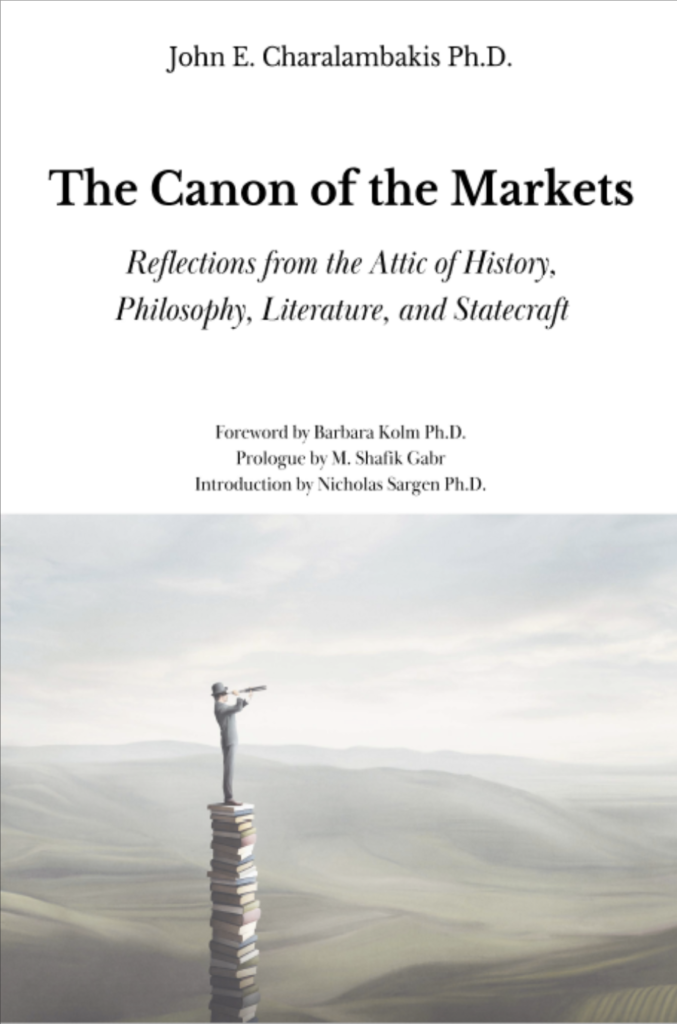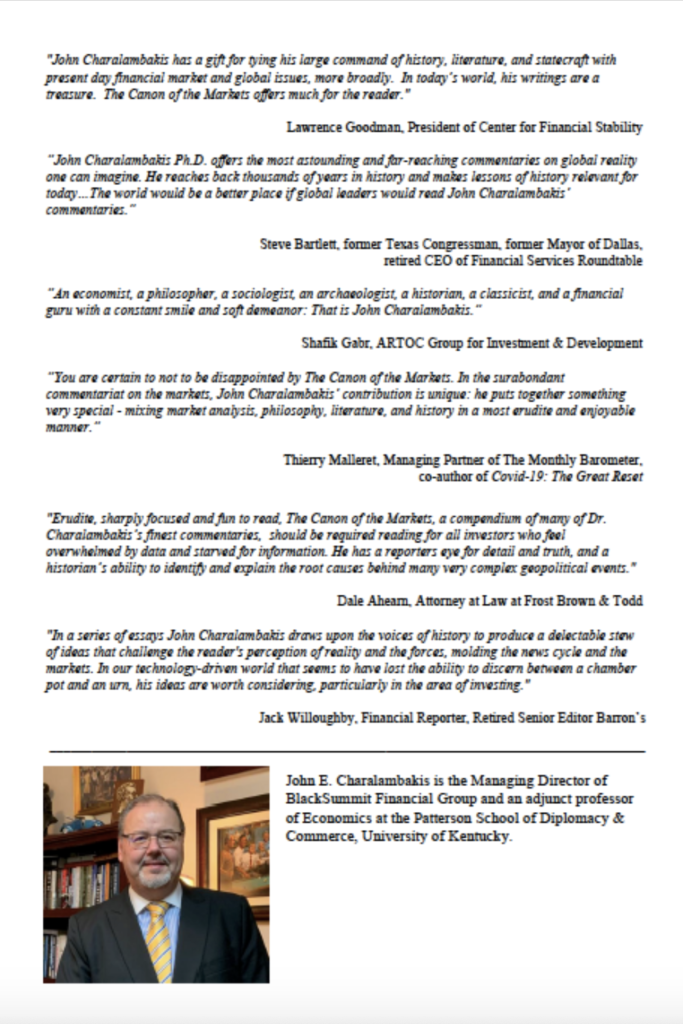“You are certain to not to be disappointed by The Canon of the Markets. In the surabondant commentariat on the markets, John Charalambakis’ contribution is unique: he puts together something very special – mixing market analysis, philosophy, literature, and history in a most erudite and enjoyable manner.”
– Thierry Malleret, Managing Partner of The Monthly Barometer, co-author of Covid-19: The Great Reset
We invite you to check out John’s new book, The Canon of the Markets: Reflections from the Attic of History, Philosophy, Literature, and Statecraft. This collection of John’s commentaries on financial markets and statecraft is now available for purchase on Amazon.com (see bottom of this message).
Volatility has come to be a driving force not only in the markets, but also in geopolitical spheres. This is plainly evident in the rising tensions around the situation in Ukraine, the topic of our first summary this week. That crisis has profound implications for the US in its relations with both Russia and China, as we explore in our second article. From there, we explore how European integration is fracturing under the weight of its single-currency system. Finally, we close with an analysis of the driving forces behind Putin’s inflammatory foreign policy. As the winds of change seem to swirl into a storm, there must always be an anchoring principle to keep the ship of progress from being blown off course. For the Western world, the principles of human dignity and liberty must be maintained, even as the storm rages.
A War in Ukraine Could Have Global Consequences
The Economist
As Russian president Vladimir Putin continues to push the envelope in eastern Ukraine, the world needs to understand the stakes of his game. While Putin’s exact intentions remain unclear (reportedly even within the Kremlin), analysts have distilled Moscow’s troop buildup to be directed towards one of four ends: invasion, securing a corridor to Crimea, destabilizing the Ukrainian government, the extraction of concessions from the West, or a combination of these. While Putin has made clear that he considers Ukraine a sort of vassal state, a full-scale invasion would pose immense risks to Russia, creating both Russian and Ukrainian casualties, inviting severe sanctions, and galvanizing Russia’s other neighbors towards NATO. A less ambitious invasion could also have drastic consequences, not least of which is the possible escalation of a local conflict into a regional war. Should Mr. Putin succeed in his incursion, it would also set a dangerous precedent – one need only look at China’s increasingly aggressive rhetoric towards Taiwan. The West’s response should therefore be threefold, utilizing deterrence, diplomacy, and preparation to decrease Putin’s hold on Europe. If it fails to do so, a Russian invasion of Ukraine would pose incredible risks – not only to Europe, but also to Russia.
Russia and China’s Plans for a New World Order
Gideon Rachman, Financial Times
Even as the West threatens “massive” and “unprecedented” sanctions should Putin invade Ukraine, there is another variable in the equation: China’s support of Russia. Both countries consider the US (and by extension the Western global order) to be conspiring to undermine their governments, leading them to take increasingly hostile positions against the US and its allies. To protect against this perceived vulnerability, both countries are looking to expand their spheres of influence – Russia on its western flank, and China in the Pacific. By so doing, they hope to end the “unipolar” supremacy the US has enjoyed since the fall of the Soviet Union, ushering in a “multipolar” era in which Russia, China, and the US each exercise power over their respective regions. Part of Russia and China’s perceived friction with the Western system is a chafing against America’s attempt to impose Western values on them. The ongoing crisis on Ukraine’s Russian border is an expression of Putin’s distaste for the US-led global coalition; as mentioned above, should he succeed in a military incursion there, it would set a clear precedent for China with Taiwan. While the two autocratic powers share a gripe against the current system, the scope of their ambitions for changing it are significantly different, primarily due to the vast differences in their economies. Whereas Russia aims to exert its muscle to control its geographical neighborhood, China has set its aims higher, to supplant the US as the preeminent global power. Historically, such a dramatic shift in global supremacy only comes on the heels of a large-scale disruptive event – such as a war. As such, China’s more gradualist approach may be ill-suited to the kind of decisive action necessary to tip the scales in its favor. Still, with so much uncertainty around the future of the US’ relations with these autocratic powers, the shape of the global order in the Day After remains to be determined.
Can Europe Hold Together?
Dalibor Rohac, Law & Liberty
The pursuit of European integration which dates back to the 1940s and 1950s, was originally founded on the idea that the destructive nationalist and protectionist policies of nation states need to be restrained. Following the dark period of the world wars, a top-down European technocracy was an appealing alternative to Soviet communism and laissez-faire liberalism. However, from the start, the European Project was “hyperambitious” to a fault. The founders of European integration believed political unification could be achieved by first fostering economic ties which would gradually lead to the emergence of a federation. Instead of creating a foundation for unity, the attempts at monetary integration in the 60s, 70s, and 80s fell apart. The Maastricht Treaty of 1992 came to propel European integration efforts forward by introducing a common currency: the Euro. Despite warnings of economists across the ideological spectrum, the European Commission’s “One Market, One Money” document overstated the economic benefits of a single currency. While European institutions argued the Euro would reduce conflict within Europe, scholars like Harvard University’s Martin Feldstein warned that imposing uniform monetary policy will create conflicts whenever cyclical conditions differ. Furthermore, imposing a single foreign and military policy with very different national traditions, cultures, and geographic circumstances would only exacerbate economic conflicts, let alone political ones.
According to the idea of “ever-closer union”, the common currency would sooner or later create enough pressure for the appropriate fiscal structure and structural reforms to be established. However, the logic of “ever-closer union” has yet to prevail. The global financial crisis of 2008, as well as the following economic turmoil and debt crises of the early 2010s, highlighted the macroeconomic instability that came from introducing a common European currency into very different economies. No grand bargain to create a fiscal union emerged from the crisis either. As the author of this article, Dalibor Rohac puts it, “The hubris of the Maastricht Treaty is bound to cast a long shadow on European politics. The Euro remains a fact of Europe’s political and economic life—in part because few can offer appealing accounts of how monetary unions can be undone in an orderly fashion.” Rohac argues the European Union would be best served by reinventing the European Union as a platform that manages Europe’s diversity and channels these differences into productive uses, but this would require returning mentally to the Europe before the Maastricht Treaty. The question remains whether European officialdom can change its habits which have been shaped by a deep belief in “ever-closer union.”
The Putin Doctrine
Angela Stent, Foreign Affairs
The Ukraine crisis is much more than Ukraine and its possible membership to the North Atlantic Treaty Organization (NATO). It is about Russian President Vladimir Putin reasserting Russia’s “rightful” place in European and global affairs. In this Foreign Affairs article, Angela Stent expands on “the Putin doctrine”: the foreign policy principles driving Putin’s actions. At the doctrine’s core is Russia’s desire for the West to respect, fear, and recognize it as a power that holds special rights in its backyard and has a voice in serious international matters, much like it was during the Soviet Union era. Putin claims the US and Europe have largely been disregarding Russia’s interests and its voice on the international stage. The doctrine also entails undermining democracies and defending authoritarian regimes, as we have seen in Russia’s interference in US elections and its support of Alexander Lukashenko in Belarus. Interlocking each element of his doctrine is Putin’s primary goal of “reversing the consequences of the Soviet collapse, splitting the transatlantic alliance, and renegotiating the geographic settlement that ended the Cold War.” To further this goal, Putin has perpetuated a narrative of grievance and loss to the West. He has described the collapse of the Soviet Union as a “great political catastrophe of the 20th century” and has lamented the fact that 25 million Russians find themselves outside of Russia, 12 million of which are in Ukraine. Of course, many of Russia’s neighbors have a very different narrative and have expressed their vulnerability time and time again. Putin believes Russia has an absolute right to its own sphere of influence in its backyard and, as such, its former Soviet neighbors should not join any alliances with the European Union or NATO. Putin clearly believes now is the time to force the West to respond to his ultimatums. From his perspective the US is weak and divided, all the while Germany’s brand-new government is trying to get its footing, and the European Union is wrapped up in domestic challenges and an energy crisis that gives Russia leverage. Even if a military conflict is avoided this time around, Putin’s doctrine will remain.


